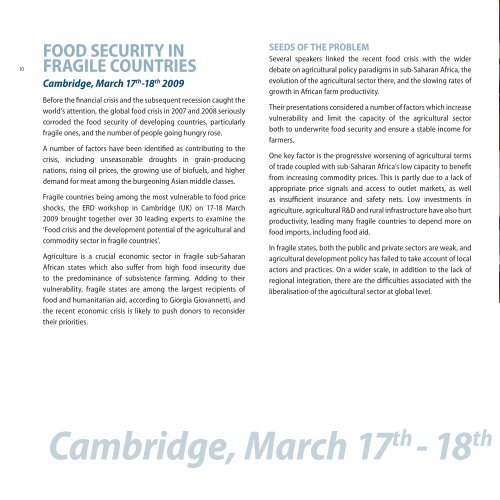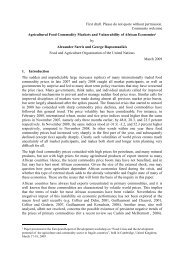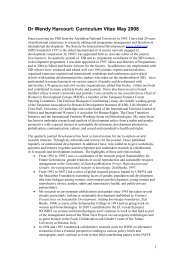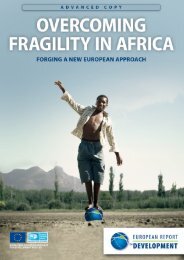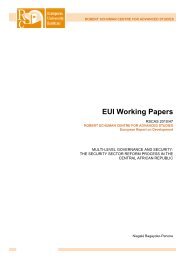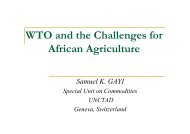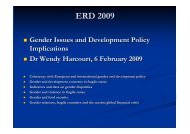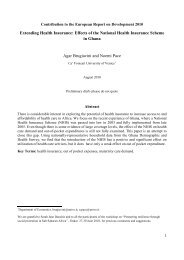TOWARDS THE EUROPEAN REPORT ON DEVELOPMENT - ERD
TOWARDS THE EUROPEAN REPORT ON DEVELOPMENT - ERD
TOWARDS THE EUROPEAN REPORT ON DEVELOPMENT - ERD
You also want an ePaper? Increase the reach of your titles
YUMPU automatically turns print PDFs into web optimized ePapers that Google loves.
FOOD SECURITY IN<br />
FRAGILE COUNTRIES<br />
Cambridge, March 17 th -18 th 2009<br />
Before the financial crisis and the subsequent recession caught the<br />
world’s attention, the global food crisis in 2007 and 2008 seriously<br />
corroded the food security of developing countries, particularly<br />
fragile ones, and the number of people going hungry rose.<br />
A number of factors have been identified as contributing to the<br />
crisis, including unseasonable droughts in grain-producing<br />
nations, rising oil prices, the growing use of biofuels, and higher<br />
demand for meat among the burgeoning Asian middle classes.<br />
Fragile countries being among the most vulnerable to food price<br />
shocks, the <strong>ERD</strong> workshop in Cambridge (UK) on 17-18 March<br />
2009 brought together over 30 leading experts to examine the<br />
‘Food crisis and the development potential of the agricultural and<br />
commodity sector in fragile countries’.<br />
Agriculture is a crucial economic sector in fragile sub-Saharan<br />
African states which also suffer from high food insecurity due<br />
to the predominance of subsistence farming. Adding to their<br />
vulnerability, fragile states are among the largest recipients of<br />
food and humanitarian aid, according to Giorgia Giovannetti, and<br />
the recent economic crisis is likely to push donors to reconsider<br />
their priorities.<br />
SEEDS OF <strong>THE</strong> PROBLEM<br />
Several speakers linked the recent food crisis with the wider<br />
debate on agricultural policy paradigms in sub-Saharan Africa, the<br />
evolution of the agricultural sector there, and the slowing rates of<br />
growth in African farm productivity.<br />
Their presentations considered a number of factors which increase<br />
vulnerability and limit the capacity of the agricultural sector<br />
both to underwrite food security and ensure a stable income for<br />
farmers.<br />
One key factor is the progressive worsening of agricultural terms<br />
of trade coupled with sub-Saharan Africa’s low capacity to benefit<br />
from increasing commodity prices. This is partly due to a lack of<br />
appropriate price signals and access to outlet markets, as well<br />
as insufficient insurance and safety nets. Low investments in<br />
agriculture, agricultural R&D and rural infrastructure have also hurt<br />
productivity, leading many fragile countries to depend more on<br />
food imports, including food aid.<br />
In fragile states, both the public and private sectors are weak, and<br />
agricultural development policy has failed to take account of local<br />
actors and practices. On a wider scale, in addition to the lack of<br />
regional integration, there are the difficulties associated with the<br />
liberalisation of the agricultural sector at global level.<br />
FERTILE POLICY GROUND<br />
The assembled policy practitioners, NGO representatives,<br />
academics and officials from international organisations drew<br />
some policy lessons from the preceding debate. They concluded<br />
that local partners and institutions, both formal and informal,<br />
should be involved in defining and implementing context-specific<br />
responses to fragility.<br />
10 11<br />
Productivity and scaling up in value chains need to be addressed<br />
through institutional, infrastructural and technological reforms.<br />
In addition, aid should combine both short- and long-term<br />
perspectives linking humanitarian aid to agricultural development<br />
policies.<br />
Cambridge, March 17 th 7 - 18 th 2009<br />
More information:<br />
http://erd.eui.eu/?page_id=794<br />
http://erd.eui.eu/media/erd-flyer-a4_cambridge.pdf


